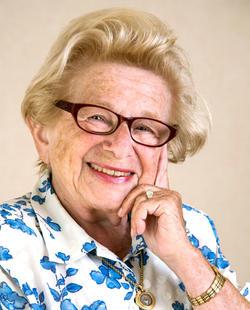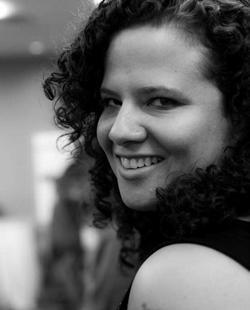Sex Educators
Every generation likes to imagine that we’ve invented sex, that our poor, prudish ancestors had no idea what they were doing and that we, by comparison, are completely enlightened and liberated. Then we go right back to stammering, blushing, shaming others for their behavior, and secretly worrying about our own quirks (“Is this normal?”). It seems that generation after generation, the real issue isn’t what we’re doing behind closed doors, it’s how we talk about it with each other. And in very different ways, Dr. Ruth Westheimer and Jaclyn Friedman have both helped shape the way we talk—and think—about sex.
Doctor Ruth Westheimer, sex therapist, was raised by nuns.
Smuggled out of Nazi Germany on a kindertransport, Karola Ruth Siegel came of age in a Swiss orphanage. Bereft of her family at the end of the war, she travelled to Palestine, where she lost her virginity in a haystack with no contraception because she knew almost nothing about sex. Later, as a psychologist and sex therapist, she began offering advice to callers on the radio in an effort to help prevent people from suffering through what she felt should be a safe, healthy, joyous experience.
That we can talk openly about sex at all is largely thanks to Dr. Ruth. She’s counseled people over radio, television, and through her many books about everything from impotence and breast implants to how couples can explore intimacy despite disabilities. Her approach is unique for its inventiveness—rather than displaying her authority through some universal solution, she invites people to be creative and try a variety of approaches to find out what works for them. Impotence might be a medical issue, or it might be caused by a bad case of nerves, or boredom. And boy, does she have suggestions for avoiding boredom!
Her training as a psychologist means her focus is always on her client’s or audience’s issues, not her own. That training, tempered by her lively personality, is her great strength: Her straightforward, unflappable manner keeps her advice from seeming salacious, and her sense of humor defuses the tension and embarrassment her audience feels and reminds us that shared laughter is crucial to real intimacy.
Most of us now learn about the basic mechanics of sex and STI prevention in school, as well as the concept that “no means no.” But there’s still a lot of confusion in American culture over what “yes” means: Is someone’s outfit an invitation to harass them? Does their behavior (say, getting drunk at a party, or asking for a ride home) count as blanket permission for rape? Jaclyn Friedman’s books, Yes Means Yes and What You Really Really Want; her podcast, F*cking while Feminist; and her work with Women, Action, and the Media have helped countless young women understand issues of consent and sexual health. Friedman’s work has helped educate young people about rape culture, crushed assumptions we make about sexuality and gender, and offered healthier possibilities for people to explore their desires.
In a powerful speech she gave at the Boston SlutWalk in 2011, Friedman said, “That word [slut] is meant to keep us in line . . . To make us police each other, turn on each other, and turn each other in so that we can prove we’re not ‘like that.’ . . . Our lives are way too often full of struggle and pain. If you do something with someone else that gives both of you pleasure and joy? You’re increasing the pleasure and joy in the world. No one should ever make you feel bad about that.”
Friedman practices what she preaches in that same unapologetic vein. She talks openly about her own experience of rape in college, about her bisexuality, and about the difficulties of finding men who are secure enough in their masculinity to date a feminist spokesperson. Her honesty about her experiences—her joys, her setbacks, and her epiphanies—gives her unconventional advice real credibility.




